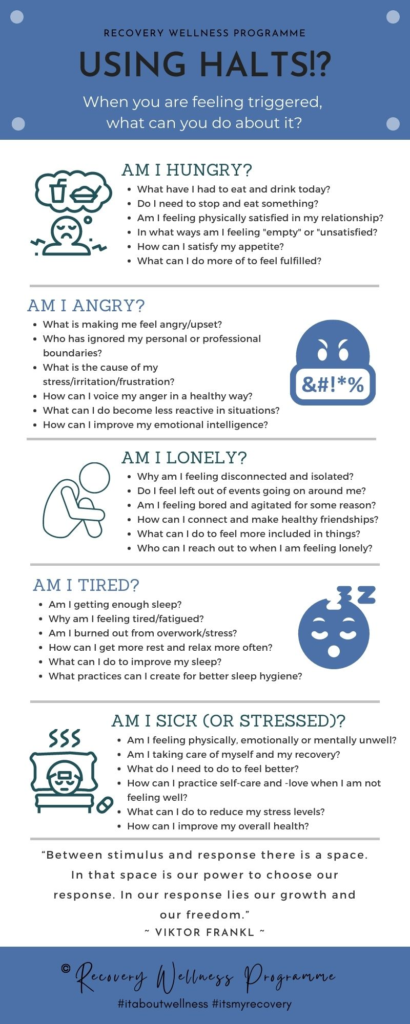What personal support systems do you have in place to support your recovery and wellness? These different areas are important to take care of so that you get less triggered less often. It is also a highly effective tool for working through what the cause of your trigger and discomfort might be.
Creating conscious space and stillness to spend a few minutes checking in with ourselves is a habit that supports wellbeing. Knowing how we feel and then responding to these feelings is an important part of having a sustainable recovery.
It is okay to have uncomfortable feelings, to be feeling lonely or to be tired and/or stressed. Once we can identify these feelings, we are then able to take steps towards taking care of ourselves and using our resources to overcome physical, emotional, social, spiritual, and mental states that might be a potential risk to our wellness.
remember: Before using any of these tools, you need to slow down, pause, and breathe to allow your brain and body time to realise that you are not in danger or under real threat (most of the time), and that you can use your thinking brain to work through what has triggered, unsettled, upset, agitated, annoyed, angered, or frustrated you and make a conscious choice to work through the feeling without starting to crave your substance of choice or act out in a self-sabotaging and/or – destructive way.
Being Hungry, Angry, Lonely, Tired & Sick (or stressed) can be detrimental to your continued recovery and wellness. Don’t underestimate how being under resourced in any of these five areas can cause points of weakness in your recovery. Be clear on what you need to do in these situations, whether that means scheduling regular meals to avoid hunger or time with friends and family to avoid loneliness!

Literally pausing and creating mental and emotional space for ourselves can prevent us from engaging in dysfunctional and unhealthy behaviour. It is this habitualised behaviour that can lead to challenging situations that might result in slips, lapses or relapses.
HALTS is also a tool that can be used for a morning check-in with yourself to determine your emotional, mental and physical state at the beginning of your day. By ensuring you are taking care of some of your basic needs, you ensure that you are less “primed for trigger”.
When I am hungry, I need to remind myself:
This can be physical hunger or thirst, an unfulfilled need for intimacy, a lack of spiritual connection, or any feeling of being “empty”.
When I am angry, I need to remind myself:
Anger is an extremely healthy emotion when expressed in a positive way. Any associated feelings of irritation, anxiety, discomfort, fear, etc. can cause triggers. Developing EQ is an essential tool in recovery.
When I feel lonely, I need to remind myself:
Being disconnected, isolated, bored, or feeling left out are uncomfortable and risky emotions for a person in early recovery. Building new, healthy social connections is an important part of recovery.
When I feel tired, I need to remind myself:
Developing healthy sleep routines and getting enough rest are important elements to a strong recovery. Making sure that are realistic in our time commitments and practising self-care are also important.
When I feel sick/stressed, I need to remind myself:
Being injured, ill, unwell, or stressed, can make us feel irritated, triggered, anxious, and extremely uncomfortable. Making sure that we care for our physical and mental health is essential in recovery. Also remember that you need to be honest with your doctor, psychiatrist, and pharmacist about your substance abuse when being treated.
This article in “Very Well Mind” looks at “5 Triggers of Relapse and How to Avoid Them“
It’s important to get familiar with your triggers! So that you can be proactive and engage in activities, past times, relationships, professional pursuits and learn to have some fun in a healthy way, while supporting your recovery.
